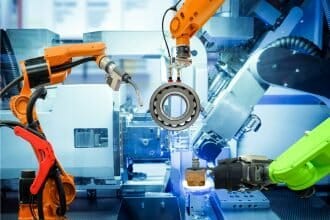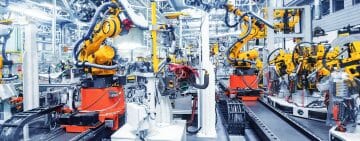
We currently find ourselves in the midst of the Fourth Industrial Revolution (or, Industry 4.0), as advanced robotics systems begin to assume increasingly sophisticated roles across a number of industries. There are many industrial robotics companies, each with a different speciality and price point. The importance of choosing the right robotics system, and company to steer us into this novel digital chapter cannot be exaggerated as we seek to meet new standards and to take on future growth challenges. This article will examine 10 industrial robotics leaders and their domains.
Mitsubishi Electric
Mitsubishi Electric, founded in 1921, continues to be a leader in the world of industrial automation since their foray into robotics systems back in 1980. In 2017, they reported a revenue of $11.97 billion USD. Innovations include their RH-CH Compact SCARA series robotic arms, which are lightweight and provide good value considering their reasonable cost. They provide three years of initial warranty for all new registered robot purchases.
ASEA Brown Boveri
ASEA Brown Boveri, also known as ABB, operates internationally in over 100 countries. ASEA and BBC Brown Boveri Ltd. both came out of late 19th century Europe (Sweden, in 1883 and Switzerland in 1891, respectively). In the 1960s and 1970s, they pioneered the first industrial paint robot and the first industrial robot to be controlled by an electric microprocessor. Post-merger in 1987, ABB has since acquired a number of other companies and continues to dominate the industrial robotics scene. In 2009, the multinational split its robotic division into two groups: Automation and Motion, and Discrete Low Voltage Products. The company reported a revenue of $6.9 billion USD in 2017 and has continued to make a name for itself in many key markets for smart productions, including material that needed Services for Foam Gasket, automotive parts, consumer electronics, food, and beverage, amongst others
B+M Surface Systems GmbH
B+M Surface Systems was founded in 1992. They are known for being high quality suppliers of fully automated painting plants and application systems for surfaces. The German company is a world leader in this domain, providing service to customers at every step of the way, from design to installation, production monitoring to technical support. They pride themselves on developing and producing key components in-house and testing new processes in their technical laboratory. In 2017, B+M reported a revenue of $4.4 billion USD.
Omron Adept Technologies
Founded in 1948, Omron Adept Technologies is headquartered in Japan, but is the largest industrial robotics company based out of the US. The company made $3.05 billion USD in 2017 and is a leader in designing and manufacturing robotics systems with smart vision-guiding features. Many of their products are cost-effective and have been made to be integrated as part of a common factory automation solution. They provide mobile robots, application software, and other related automation systems and products.
FANUC Robotics
Another Japanese robotics company, FANUC Robotics provides industrial robots in more than 100 different models, which are known for their ease of use and flexibility. Their recent focus has been on incorporating Artificial Intelligence (AI) into their solutions to ensure their products maintain their competitive, intelligent and dynamic edge. The company’s revenues were reported at the $1.7 billion USD mark in 2017 and in the past year they’ve begun construction on a new robotics facility boasting 461,000 square-feet adjacent to their North American headquarters in Auburn Hills, Michigan.

Yaskawa
Japan’s Yaskawa, founded in 1915, launched into the world industrial robotics when it developed its fully-electric Motoman industrial robot back in 1977. Since then, they’ve sold over 300,000 Motoman robots around the world and continue to be a reputable purveyor of factory robots capable of everything from welding to packaging, assembly to material removal. The company’s revenues were about $1.5 billion USD in 2017 and with a new Slovenian subsidiary plant set to open in the second half of 2019, production will undoubtedly continue to grow.
Kuka
Founded in 1898, Germany’s Kuka is well-known for its signature bright-orange robots, most commonly used in automobile manufacturing. Offering both robots and software solutions, the company has doubled down on its focus on robotics and automation since the early 2000s by moving away from other areas. A pioneer of Industry 4.0, Kuka are experts in modern factory automation that typically entails sophisticated system integration. In 2016, Kuka was acquired by the Chinese company, Midea Group for $3.9 billion USD. A year later, the company reported a revenue of about $1.4 billion USD.
Epson Robots
When Epson Factory Automation Group first came to the Americas in 1984, it was to support the growing demand for automated manufacturing. Since then, they’ve grown as leaders in the industry, renowned for their innovation particularly in the small parts assembly space. For instance, they introduced the first compact SCARA (Selective Compliance Assembly Robot Arm) robot, amongst other technological feats. Epson Robots reported a revenue of $1.4 billion USD in 2017.
Kawasaki
Kawasaki might be a household name given the popularity of their broad range of consumer goods, from motorcycles to electric keyboards. However, they’re a true industrial superstar that boasts a, perhaps surprising, diverse portfolio of automation products, which can be found in any number of different international markets. Their duAro SCARA robot has made a significant impression in the world of robotics, featuring a dual-arm capable of carrying up to two kilograms of weight in both of its arms, while working alongside humans on the factory floor. Though the Japanese company was founded in 1896, 2017 revenues of $1.3 billion USD prove that they’re more than capable of addressing modern manufacturing needs.
Staubli
The Staubli Group was founded in 1892 and has, since its early days, been known for its devotion to quality engineering when it comes to products for the factory floor. Today, this mechatronics company has three core sectors, one of which is textiles—staying true to the company’s roots in developing products for the weaving industry. Staubli also focuses on developing connectors (both fluid and electric), as well as industrial robots. Their acquisition of Unimation, known for being the first robotics company in the world, has anchored their position in the world of manufacturing automation. Staubli’s revenues in 2017 were about $1.26 billion USD and in the same year, they launched a line of industrial robots.
Industry 4.0 is in full swing, as the world’s top industrial robotics companies reap the rewards of the last two years. Many have worked to innovate, simplify and improve factory automation benefiting both their bottom line and that of their clients. As we continue to move through Industry 4.0, industrial robotics services are projected to rake in well over $4 billion USD in revenue by 2021. Indeed, it looks like these companies will be around for a long time.
This is an article provided by our partners network. It might not necessarily reflect the views or opinions of our editorial team and management.
Contributed content

Founder Dinis Guarda
IntelligentHQ Your New Business Network.
IntelligentHQ is a Business network and an expert source for finance, capital markets and intelligence for thousands of global business professionals, startups, and companies.
We exist at the point of intersection between technology, social media, finance and innovation.
IntelligentHQ leverages innovation and scale of social digital technology, analytics, news, and distribution to create an unparalleled, full digital medium and social business networks spectrum.
IntelligentHQ is working hard, to become a trusted, and indispensable source of business news and analytics, within financial services and its associated supply chains and ecosystems




























